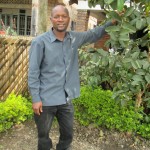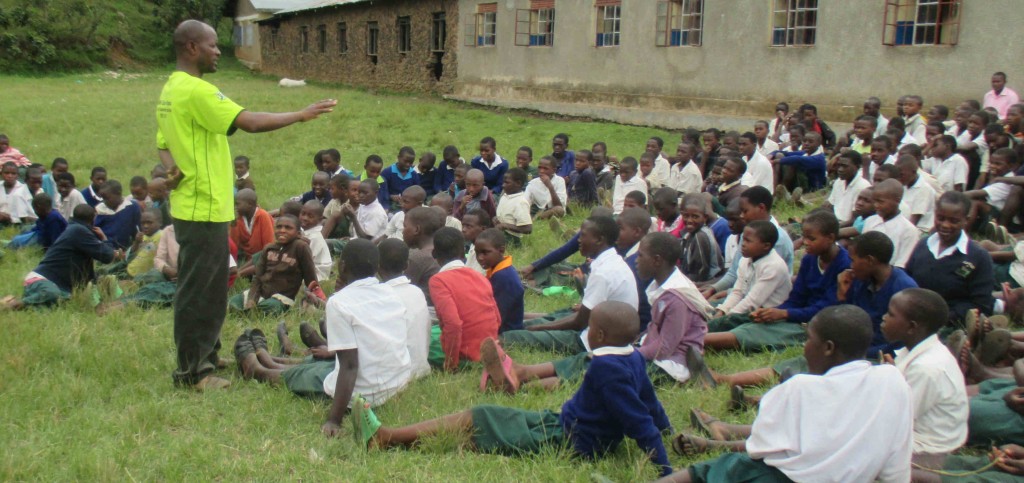
Denis delivering an awareness campaign at the Kabami Primary School.
With PEN's support, I was able to visit 5 secondary and 22 primary schools to promote an awareness campaign about the conservation of Ugandan primates and their habitat. At 9 schools, the visit included pedal powered cinema presentations about apes (gorillas, chimpanzees, orangutans, bonobos, and gibbons) and how they are related to human beings. Through the film screenings, the children and teachers learned about who the apes are, where they live, and how they live by observing their behaviors and interactions, thus developing positive attitudes for conservation.
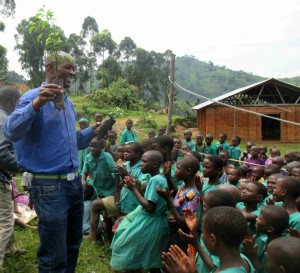
At a primary school near the Bwindi Impenetrable National Park, Denis teaches children about tree planting and they clap with appreciation!
At all of the 27 schools I visited, I conducted public assemblies, followed by tree planting. Children were asked to collect seedlings around their schools and homes. The seedlings that were of the most interest were the avocado fruits, as well as indigenous species. I encouraged people to plant trees to increase the forest cover in the local communities and to avoid extraction of resources from the nearby gazetted national parks. The planting of fruit trees generates a livelihood opportunity by multiplying food production within the communities. Tree planting activities also provide a platform for the youth to participate in the fight against climate change and to improve their own environment.
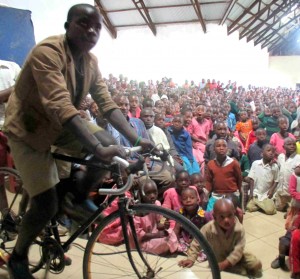
1,040 children, teachers, and local community members gathered to view a film on apes during Denis’ pedal powered cinema screening.
In addition to using the pedal powered cinema equipment and giving presentations at school assemblies, I utilized The Great Apes Kit donated by The Project for the Conservation of the Great Apes and the French National Museum for Natural History. The kit allowed me to share information about great ape morphology using physical specimens and pictures to aid education. This activity allowed community members that had never seen a primate to gain a clear understanding of what they look like and how closely related they are to humans.
I also organized four educational trips for schools to visit nearby national parks, allowing children to witness firsthand the importance of these forests in primate conservation. By asking the park rangers questions, they were able to learn more about conservation and ecotourism activities conducted within the national parks. Three of these trips involved children visiting Mgahinga Gorilla National Park. One trip included a group hike to the summit of Mount Muhabura where there is a crater lake. The other two visits involved students participating in nature walks through the park’s forest habitat. The fourth visit was to the Bwindi Impenetrable National Park where students took a nature walk up to the stunning Bayenda Waterfalls.
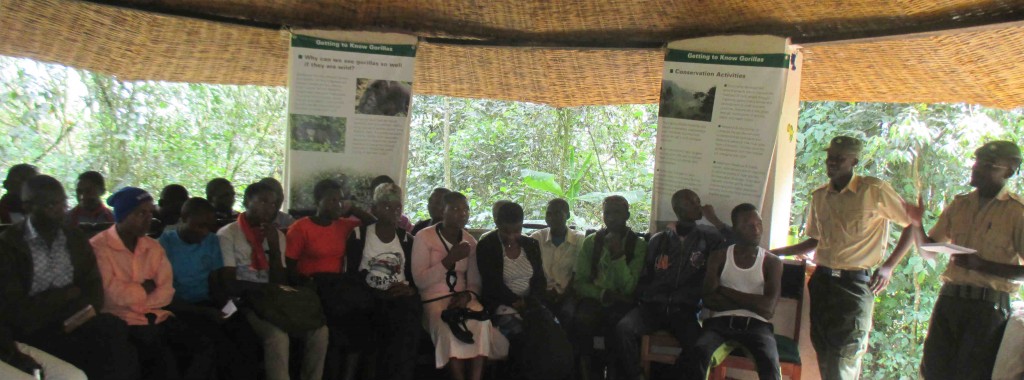
After a nature walk in the forest of Bwindi Impenetrable National Park, the students are evaluated through a question and answer session with the park rangers and Denis Agaba.
The awareness campaigns and national park visits resulted in increased knowledge of the participants’ understanding of primates and the value of conserving their natural habitat. The primate species of particular interest included mountain gorillas, chimpanzees, baboons, and numerous other species living within the two national parks of Southwestern Uganda. The interaction the children had with nature inspired them to become advocates for primate conservation and further participate in conservation activities back at their schools and homes.
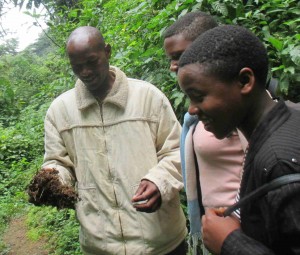
Denis shows his students seeds germinating from elephant dung at the Bwindi Impenetrable National Park.
After visiting the schools and initiating tree-planting programs, the schools’ headmasters asked me to return and continue my education efforts in the communities, as well as speak with the parents during their parent and teacher meetings.
I am proud to be a winner of PEN’s Lessons Learned Challenge Prize Contest and am grateful for the support to educate and inspire communities to value and protect primates and their habitat. As a next step, I would like to return to the schools I visited to ensure the communities are properly caring for their tree seedlings and to reach more community members.








